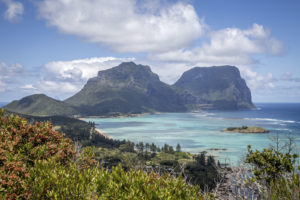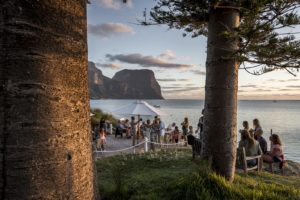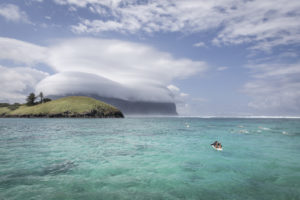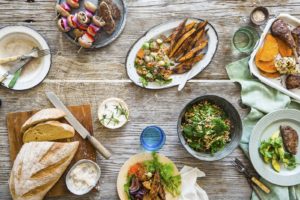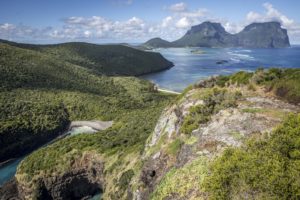Luke Hanson parachuted in to help run Pinetrees in 2010, without any hospitality experience, and has been distracted ever since.
He once thought that, in time, he would be accepted by the staunch Lord Howe locals through hard work and unconditional friendliness, but neither has cracked the nut. Instead, his sole redeeming feature is that he married sixth generation islander, Dani Rourke, and helped produce his seventh generation islander daughters, Elsie and Pixie. He now spends his days exploring Lord Howe’s remote nooks with guests, taking photos, dreaming about snow, and stewing over the Pinetrees P&L between 10pm and midnight. After midnight, he worries about the trivial things like mortgages, recessions, coastal erosion and the future of the air service to Lord Howe.
Luckily, he did something half decent in his former life…
Where are you from?
I grew up around Cronulla on the southern beaches of Sydney, and even though I moved away when I was 18, it still feels like home. There’s something about the walk along the Esplanade from the Surf Club to Cronulla Point that makes me proud of my roots.
Where did you go to high school?
Sydney Grammar School in the CBD of Sydney
What did you do for fun as a teenager?
Life revolved around Cronulla Surf Club, training in the winter and competing in the summer, but we also rode skateboards, drove our tinnies in Port Hacking, surfed, and got up to the kinds of shenanigans that coastal kids do.
Where did you go to university and what did you study?
I went to the Australian National University in Canberra and studied ecology. A few years later, I won a scholarship to do a PhD at the University of Oxford, but couldn’t get motivated to live in England. I’d rather stick pins in my eyes.
What did you do in your spare time at university?
Canberra is the bush capital and there are endless distractions for outdoors people – mountain biking, hiking, kayaking, fishing, camping, skiing and surfing. I joined the Ski Patrol at Blue Cow and skied for four days (maybe a bit more…) every week in winter. By the end of university I also had a full-time job with the Murray Darling Basin Commission and was travelling along the Murray River on a regular basis. It’s a beautiful part of Australia.
List the countries you’ve travelled to
New Zealand, Papua New Guinea, Indonesia, Malaysia, Thailand, Laos, Vietnam, Philippines, South Korea, China, Japan, Nepal, Greece, Croatia, Italy, Austria, Germany, Switzerland, France, England (for three days only), USA and Canada – not many compared to the places people reach these days….
Which countries have you lived in for longer than 6 months?
I lived in Papua New Guinea for five years and Indonesia for one year. I’ve also spent over a year in Japan, but that was over several ski seasons.
What languages do you speak?
I once spoke Tok Pisin reasonably well, and could have a fluent conversation about snow conditions and weather in Japanese, but really I’m a hack in anything other than English.
Tell a story about an unforgettable travel adventure you’ve had
Working as a field scientist in Papua New Guinea was an endless, and sometimes terrifying, adventure. I flew on a plane that crashed on the next sector, was robbed at gunpoint by a drunk policeman, got chased along the east coast of Bougainville by a band of BRA fighters with AK47s, missed the Aitape tsunami by a couple of days, and saw the Rabaul volcanoes erupt on a regular basis (I had to scrape the volcanic ash off the windscreen to keep driving). PNG’s official travel slogan at the time was ‘expect the unexpected’, and it was accurate.
The experience that will live with me for the rest of my days happened in Nepal in 2005. I had climbed with a Sherpa guide, Dawa, up to an unnamed saddle to the west of Gokyo Peak and reached a point about 5,800 metres above sea level when we unexpectedly saw the full north face of Cho Oyu, the sixth highest mountain in the world. As we panned from north to east we saw another three of the highest mountains in the world, including Everest, Lhotse and Makalu, in perfect afternoon light.
Being partially hypnotised by the experience, chilled by the ice we were sitting on, and lethargic from the altitude, we stayed on our unnamed saddle for too long, and started our descent just before dark. The ridge was broad and safe, but we realised that we’d have to navigate our way from Gokyo Sixth Lake to Gokyo Village (about 10km) in the dark along a broken track, through glacial moraine. It was tricky during the day, but we had head lamps and if we took our time, we’d be fine. There was nothing unusual at this point, except for a mild feeling of hunger.
The next bit, though, is where things went a bit strange. Dawa refused to take the torch, said “follow me Mr Luke”, and walked into the pitch black landscape. At first I thought he was mucking around, but then he started to chant in that low monotonous Buddhist style and continued chanting, non-stop, for the next four hours until we reached Gokyo. I still can’t explain what happened. Dawa walked in absolute pitch black darkness, through complex glacial terrain, far enough in front of me to have no benefit from my torch. All I did was stumble along behind his chanting, and voila, we were home. He was sick the next day, just for the day, and the only explanation he offered for his almost magical exploit was “I’m a Sherpa”. I’m not religious, and only mildly spiritual (whatever that means), but something happened that night beyond my understanding.
Tell a story about a funny situation you’ve had while travelling
A few days later, on the same trek through the Khumbu, we were staying in a Sherpa owned lodge in Phakding. The owners were relatives of Dawa so we were invited into the family kitchen, while the other trekkers ate in the dining room. My travelling mate, Chris Curtis, was a serious chef and ran a five star hotel in Dubai. When we walked into the family kitchen, we were gobsmacked. Cooking a multi-course dinner for about 40 trekkers were three Sherpa women with one small pressure cooker and two open fires. There were pots boiling, pans crashing, smoke everywhere, and somehow, perfect plates of food were being carried through the kitchen door (eventually by me – it was my first experience as a waiter). After an hour of ‘service’, I walked back into the kitchen with a pile of empty plates to see the three Sherpa women in a complete frenzy (I now know that it was the transition from mains to desserts, and it was chaotic). Without thinking, I said in a loud Australian voice “wow, busy, busy, busy”. Harmless enough.
The three Sherpa woman stopped, dropped their pots and looked at me. The room went deadly silent other than the hiss from the pressure cooker. Their look of horror made my mate, Chris, shrink into his fireside chair, breathless, and stare at me as well. And then, without warning, the Sherpa women burst into a state of hilarity that was as intense as their cooking. They screamed, hollered, laughed and cried – all at my expense. But why? It turns out that the word ‘busy’ in English is the same word in Sherpa that describes a specific part of the female genitalia. How could I know that? Luckily, once they finished their hysterics, I received a wonderfully warm (and sweaty) group hug, and the cooking continued. I don’t think I’ve ever spoken the word ‘busy’ again.
What other jobs have you had?
I was a paperboy when I was 12 (remember them?), but didn’t have a proper job until my first professional job as a scientist. I was also a ski patroller in Australia and New Zealand, mountain guide in Canada and Japan, and once spent eight months travelling the world to promote the book I’d co-written about poverty in Papua New Guinea. I’ve worked for the Australian Government in PNG and the United Nations in Indonesia, Philippines and Nepal. They were amazing days.
What got you interested in hospitality?
I’m not – I’m an introverted scientist who married into the wrong family. But I’m working on it.
What’s your perfect job?
I’d own a heli-ski lodge in the Monashee Mountains of British Columbia (without the stress of a mortgage) and spend the northern hemisphere winters near Wanaka in New Zealand. It’s no coincidence they’re both about as far as you can get from the perfect subtropical beaches of Lord Howe Island. In the meantime, I love guiding our Seven Peaks Walks and watching Trevor Hendy host our Ocean Swim Weeks – he’s one third fish, one third guru, and one third comedian.
How do you spend your spare time?
I used to surf most days on Lord Howe, but with a bossy wife, two kids, 75 guests and 30 staff, I’m lucky to get to talk to someone who’s been surfing. Instead, I take the kids walking in New Zealand and skiing in Utah (do you see the pattern?) where we watch the Weather Channel together and talk about the different kinds of powder snow. Dani and I are slowly ticking off the Great Walks of Australia (without kids) since we’ve replaced full-pack walks with ‘luxury’ walks – fancy a three course dinner and beautiful McLaren Vale shiraz after your day in the Flinders Ranges? Yes please. I also take a lot of photos and write for a few magazines.
Tell me three things that other people find interesting about you?
It turns out that there aren’t many scientists who surf and ski, and worked in PNG, who married a girl from Lord Howe Island. These days the only things that people find interesting about me is that I’m the father of Elsie and Pixie, and husband of Dani.
What have you done (even something really small…..) for humanity?
I co-wrote a book that helped the UN, World Bank, bilateral donors and NGOs decide how to spend their aid budgets in PNG. I’ve also rescued people in the surf, dug people out of avalanche debris, and co-wrote a really lovely cookbook. Funnily enough, I think I’m doing my best work now – helping stressed guests relax and rejuvenate so they can go home and do something for humanity. Barry, Peter, Nick and Tanya – no pressure.
Meet our staff – Dennis Tierney


